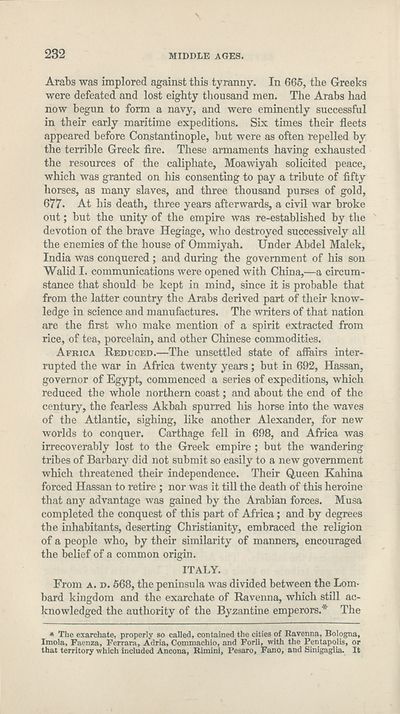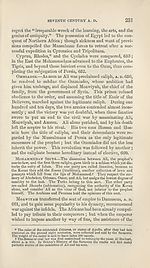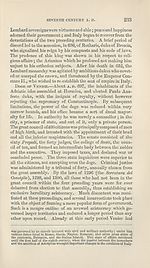Download files
Complete book:
Individual page:
Thumbnail gallery: Grid view | List view

232
MIDDLE AGES.
Arabs was implored against this tyranny. In 665, the Greeks
were defeated and lost eighty thousand men. The Arabs had
now begun to form a navy, and were eminently successful
in their early maritime expeditions. Six times their fleets
appeared before Constantinople, but were as often repelled by
the terrible Greek fire. These armaments having exhausted
the resources of the caliphate, Moawiyah solicited peace,
which was granted on his consenting to pay a tribute of fifty
horses, as many slaves, and three thousand purses of gold,
677. At his death, three years afterwards, a civil war broke
out; but the unity of the empire was re-established by the
devotion of the brave Hegiage, who destroyed successively all
the enemies of the house of Ommiyah. Under Abdel Malek,
India was conquered; and during the government of his son
Walid I. communications were opened with China,—a circum¬
stance that should be kept in mind, since it is probable that
from the latter country the Arabs derived part of their know¬
ledge in science and manufactures. The writers of that nation
are the first who make mention of a spirit extracted from
rice, of tea, porcelain, and other Chinese commodities.
Africa Reduced.—The unsettled state of affairs inter¬
rupted the war in Africa twenty years; but in 692, Hassan,
governor of Egypt, commenced a series of expeditions, which
reduced the whole northern coast; and about the end of the
century, the fearless Akbah spurred his horse into the waves
of the Atlantic, sighing, like another Alexander, for new
worlds to conquer. Carthage fell in 698, and Africa was
irrecoverably lost to the Greek empire ; but the wandering
tribes of Barbary did not submit so easily to a new government
which threatened their independence. Their Queen Kahina
forced Hassan to retire ; nor was it till the death of this heroine
that any advantage was gained by the Arabian forces. Musa
completed the conquest of this part of Africa; and by degrees
the inhabitants, deserting Christianity, embraced the religion
of a people who, by their similarity of manners, encouraged
the belief of a common origin.
ITALY.
From a. d. 668, the peninsula was divided between the Lom¬
bard kingdom and the exarchate of Ravenna, which still ac¬
knowledged the authority of the Byzantine emperors* The
MIDDLE AGES.
Arabs was implored against this tyranny. In 665, the Greeks
were defeated and lost eighty thousand men. The Arabs had
now begun to form a navy, and were eminently successful
in their early maritime expeditions. Six times their fleets
appeared before Constantinople, but were as often repelled by
the terrible Greek fire. These armaments having exhausted
the resources of the caliphate, Moawiyah solicited peace,
which was granted on his consenting to pay a tribute of fifty
horses, as many slaves, and three thousand purses of gold,
677. At his death, three years afterwards, a civil war broke
out; but the unity of the empire was re-established by the
devotion of the brave Hegiage, who destroyed successively all
the enemies of the house of Ommiyah. Under Abdel Malek,
India was conquered; and during the government of his son
Walid I. communications were opened with China,—a circum¬
stance that should be kept in mind, since it is probable that
from the latter country the Arabs derived part of their know¬
ledge in science and manufactures. The writers of that nation
are the first who make mention of a spirit extracted from
rice, of tea, porcelain, and other Chinese commodities.
Africa Reduced.—The unsettled state of affairs inter¬
rupted the war in Africa twenty years; but in 692, Hassan,
governor of Egypt, commenced a series of expeditions, which
reduced the whole northern coast; and about the end of the
century, the fearless Akbah spurred his horse into the waves
of the Atlantic, sighing, like another Alexander, for new
worlds to conquer. Carthage fell in 698, and Africa was
irrecoverably lost to the Greek empire ; but the wandering
tribes of Barbary did not submit so easily to a new government
which threatened their independence. Their Queen Kahina
forced Hassan to retire ; nor was it till the death of this heroine
that any advantage was gained by the Arabian forces. Musa
completed the conquest of this part of Africa; and by degrees
the inhabitants, deserting Christianity, embraced the religion
of a people who, by their similarity of manners, encouraged
the belief of a common origin.
ITALY.
From a. d. 668, the peninsula was divided between the Lom¬
bard kingdom and the exarchate of Ravenna, which still ac¬
knowledged the authority of the Byzantine emperors* The
Set display mode to:
![]() Universal Viewer |
Universal Viewer | ![]() Mirador |
Large image | Transcription
Mirador |
Large image | Transcription
| Antiquarian books of Scotland > Education > Elements of universal history on a new and systematic plan > (252) |
|---|
| Permanent URL | https://digital.nls.uk/127583164 |
|---|
| Description | Thousands of printed books from the Antiquarian Books of Scotland collection which dates from 1641 to the 1980s. The collection consists of 14,800 books which were published in Scotland or have a Scottish connection, e.g. through the author, printer or owner. Subjects covered include sport, education, diseases, adventure, occupations, Jacobites, politics and religion. Among the 29 languages represented are English, Gaelic, Italian, French, Russian and Swedish. |
|---|

